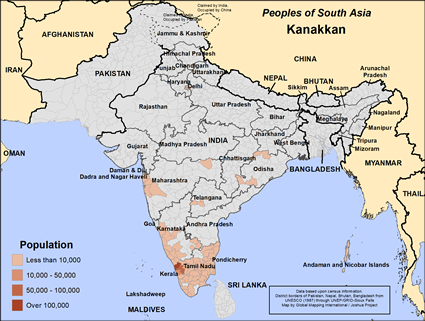Kanakkan in India

Send Joshua Project a photo
of this people group. |

Map Source:
People Group data: Omid. Map geography: UNESCO / GMI. Map Design: Joshua Project.
|
| People Name: | Kanakkan |
| Country: | India |
| 10/40 Window: | Yes |
| Population: | 257,000 |
| World Population: | 257,000 |
| Primary Language: | Malayalam |
| Primary Religion: | Hinduism |
| Christian Adherents: | 0.02 % |
| Evangelicals: | 0.00 % |
| Scripture: | Complete Bible |
| Ministry Resources: | Yes |
| Jesus Film: | Yes |
| Audio Recordings: | Yes |
| People Cluster: | South Asia Dalit - other |
| Affinity Bloc: | South Asian Peoples |
| Progress Level: |
|
Introduction / History
In 1909, a British writer wrote that the Kanakkan people wore a sacred thread, which is normally reserved for high caste Brahmins. This is strange since this group is from a scheduled caste community. Traditionally they worked as coconut pickers who also extracted toddy from coconut and palm trees.
The Kanakkan people live in India's southern states.
What Are Their Lives Like?
This is an endogamous community, meaning that they only marry within their own. If you do some web searching, you will find that they have their own matrimonial sites. They commonly marry their cousins. When a Kanakkan couple gets divorced, they have a very simple procedure: they just separate, and everyone understands that they are divorced. Their children can stay with either parent. Nuclear families are becoming more common among them.
Most of them are landless agricultural laborers. They have a surprisingly high literacy rate given their low economic status.
What Are Their Beliefs?
Almost all of them are Hindus, though there are a few who profess Christianity. They family deity is Nerachikavu Bhagvati. They also worship various village and other Hindu deities.
What Are Their Needs?
The Kanakkan people need the spiritual hunger it takes to heed the call of Christ.
Prayer Points
Pray for spiritual hunger among the Kanakkan people.
Pray for them to have ready access to the many Christian materials that are in the Malayalam language.
Pray for Indian mission groups to reach out to them until there is a cascading church planting movement among them.